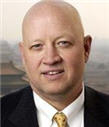2013 China Trade Mission Blog – Day 2
Tuesday, April 9, 2013 – Trade Briefing & More
The morning began with a session on building California-China trade and investment. In addition to the in-depth briefing, delegates participated in Q&A sessions with some of the foremost experts on the historical, economic, business and cultural ties between China and California. The group also heard from fellow delegates as to their successes and challenges in China.
Nancy McFadden, executive secretary in Governor Brown’s office, opened the briefing with words of welcome.
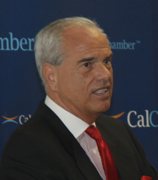
Mike Rossi
Mike Rossi, the Governor’s senior advisor, added his welcome to the Governor’s first trade delegation, commenting that this is a historic moment, and that it has been 10 years since the state has had an office abroad. He noted that studies show China will be investing to a new level in the United States, and California would like to be a part of that.
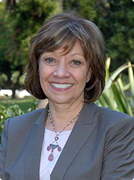
Karen Ross
Karen Ross, secretary of the California Department of Food and Agriculture, highlighted the state’s agricultural export strategy. Over the last year, agricultural exports from California to China have increased 53 percent to $1.1 billion. She forecasted positive growth for the upcoming few years.
China is currently California’s third largest global destination for agricultural products, following Canada and the European Union, with $1.7 billion in exports in 2011. This represents a 25 percent increase from 2010 and a 183 percent increase from 2007. Consistent with the state’s agricultural export profile, the top five products were almonds, pistachios, wine, walnuts, and cotton.
The California delegation includes members representing almonds, pistachios, raisins, strawberries, wine, and organic interests. The agricultural delegates will be meeting with high-level Chinese agricultural government officials, which is very important to gaining access to the Chinese market.
Lessons Being Learned
Top executives from three CalChamber member companies — Driscoll’s, SVB Global Private Equity Services and The Walt Disney Company — spoke about their experience doing business with China.
First we heard from Timothy Stratford, a partner of the law firm Covington & Burling, which has offices in Beijing and Shanghai. He highlighted the importance of knowing China’s legal system. Most of the growth in China has been in its infrastructure, but now there is a need to look beyond. Wages in China are increasing. The Chinese are seeking to build a more innovative economy and not just be the “factory of the world.” Now in its twelfth, “five-year plan,” China is eyeing new industries, especially in energy. It is important to know the approval procedure for foreign direct investment (FDI) into China, as not all FDI is permitted.
He pointed out that the 2013 American Chambers of Commerce Abroad (AmCham) Business Climate Survey is positive for companies that have “figured out” how to do business in China.
Meanwhile, China has had a major increase in outbound FDI, with a goal of increasing that figure by 17 percent each year, although that focus is a new experience for Chinese companies. The new leadership in China understands the environmental issues in China and the challenges faced by Chinese companies operating in a global society.
Sean Martin, chief financial officer of Driscoll’s, observed that there once were 25,000 cars made in China each year; now there are 14 million. He commented that if you look around in many Chinese cities, you will see at least 10 cranes, so there is much building all around. China’s joining the World Trade Organization (an action supported by the CalChamber) has made a major difference. Since then, the provincial governments have been more progressive in working internationally. Moreover, the new central administration in Beijing is looking to move China forward globally.
Andy Tsao, managing director of global private equity services for Silicon Valley Bank, said the commercial bank was founded in 1983 and located in Santa Clara with a focus on technology and agriculture. The bank is lending to small businesses in China also and has more than 300 clients in China. It is the first technology-focused bank operating in China.
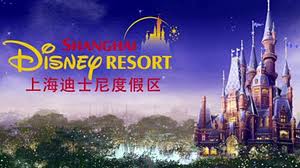
Disney Shanghai Resort
Yvonne Pei, senior vice president of The Walt Disney Company, reported that the “Magic Kingdom is moving to the Middle Kingdom.” Now under construction is a Disney Park and Resort planned to open by the end of 2015 in Shanghai. The park will feature the largest Disney castle in the world, and is the company’s largest foreign investment overseas.
She said Disney has worked with the Chinese to allow more Disney movies into China, and is hoping to be able to open a Disney TV channel at some point. Right now the big focus is on the consumer products sold in China. Chinese parents spend a lot of money on their children’s education. Disney has created Disney English to help Chinese children learn English via listening to Disney stories. This is a bit different then the purely academic approach of learning English, and has been well-received by Chinese families. Disney is creating new characters, as western content is not shown on Chinese TV in the afternoon, so there will be use of both iconic Disney characters as well as new Chinese-specific Disney characters.
Matt Rodriguez, secretary of the California Environmental Protection Agency (Cal/EPA), said issues of importance to both the China and California economies include climate change, energy efficiency and automobile efficiency. Cal/EPA will be meeting with a number of Chinese government officials regarding these issues and discussing how a government can have strong environmental regulations while maintaining a strong economy, which is so important.
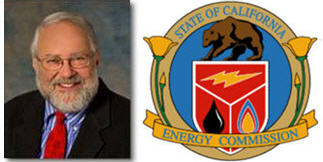
Robert Weisenmiller
Robert Weisenmiller, Ph.D., chair of the California Energy Commission, commented that California continues to be interested in reducing reliance on fossil fuels. A major issue and topic of discussion with the Chinese will be energy efficiency, including batteries and building standards.
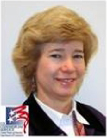
Rosemary Gallent
Rosemary Gallent of the U.S. Embassy Beijing, said opportunities in China mirror the strengths of California. She noted that the embassy works in all areas of China and advised listeners to remember that the “second tier” cities have populations of 30 million, so companies should look to all markets. The U.S. Embassy Beijing has the largest U.S. commercial section abroad.
Conrad Wong, intellectual property rights (IPR) attache with the U.S. Embassy, reported that IPR enforcement is a big concern for companies in China. A company’s trademark is the most important, he said, so get it registered — the rule is ” first to file,” not “first to use.” He said companies need to work with central, provincial and municipal level governments in China on this issue and urged companies to talk and work directly on the IPR issue with their counterparts. The economy in China is moving to high-end products, he said.
Mike Heath, economic section unit chief at the U.S. Embassy, said the unit can help direct companies to a newly created data base that the AmCham in China is developing that lists investment projects and investment interest.

Caroline Beteta
Caroline Beteta spoke about California tourism. For the last 10 years, she has been the president and CEO of California Travel and Tourism Commission, which brings in an average of nearly $4 billion to the state’s economy. Visit California is a public-private partnership that has a presence in more than 20 countries.
The State Department reports that 1.18 million Chinese tourists visited the United States in FY 2012 (October 1, 2011 to September 30 2012), and China’s National Tourism Administration forecasts 2 million visitors to the U.S. by 2015. A million jobs in California are related to tourism, and California is the largest tourism state in the United States, she reported.
Caroline said Governor Edmund G. Brown Jr. will launch a new historic tourism campaign geared to the Chinese population this week. (Read the April 12 Visit California news release on the launching of the first consumer marketing campaign in China and appointment of a California tourism ambassador.) Although tourism is a service export listed differently than goods exports, tourism is equally valuable to the economy.
Caroline showed the California tourism video featuring actor Rob Lowe with the theme “Find Yourself Here.”
Tourism from China has grown significantly in the last two years due to several recent developments. In December 2007, China granted the United States “approved destination status,” allowing Chinese citizens to visit as tourists. The State Department also has speeded visa processing by adding consular personnel. Wait times for a visa have been reduced from 57 days in Beijing and 65 days in Shanghai in 2011 to as little as a week.
James McGregor, senior counselor with APCO Worldwide, was the final speaker. He has lived in China for more than 20 years and is the author of a number of books, including No Ancient Wisdom, No Followers: The Challenges of Chinese Authoritarian Capitalism and One Billion Customers: Lessons from the Front Lines of Doing Business in China. He is the former CEO of Dow Jones & Company in China and Wall Street Journal bureau chief in China and Taiwan.
He commented that growth in China has gone from bicycles to Bentleys in the major cities, but people from other cities have enjoyed growth now too, with international tourism packages.
James recommended China Inc.: How the Rise of the Next Superpower Challenges America and the World (Ted Fishman) as the key to understanding for investors. California companies are very concerned about risk, but the Chinese are interested in opportunities. The urbanization of China has been amazing, he said. For example, 50 million farmers have moved to cities. The emphasis in China is to build satellite cities about an hour outside of the major cities to house the population moving there. This population needs “housing registration” and they need to be moved in to the consumer class. Online shopping has taken off in just the last six months, he said, adding that it is open and more entertaining than television which is still state-run.
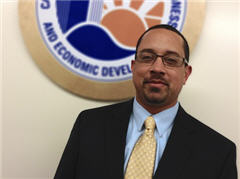
Kish Rajan
He also recommended reading The Party: The Secret World of China’s Communist Rulers (Richard McGregor).
Many thanks to Kish Rajan for facilitating the Q&A session. He serves as the director of the Governor’s Office of Business and Economic Development (GO-Biz).

Janet Lamkin
Janet Lamkin, the California state president of Bank of America and chair of the Bay Area Council, as well as a CalChamber Board Member, wrapped up the event after thanking all of our informative speakers.
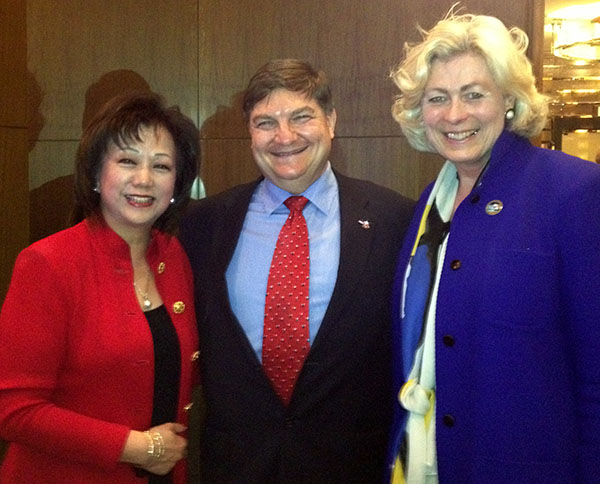
Margaret Wong, president and CEO of McWong International, Inc.,
Dale Wright of the U.S. Embassy, Commercial Section, and Susanne Stirling
Walking Tour
In the afternoon, we had the opportunity to explore the ancient Forbidden City and take a walking tour of Tiananmen Square. The Forbidden City dates back to the 15th Century and has been recognized by UNESCO as having the largest collection of ancient wooden structures in the world. We learned more about the architecture of the imperial palace. The buildings face to the south, because it was believed that the north was a harmful direction, as enemies of China often came down from the north. We also heard a few stories such as of the fire of the Hall of Venerating Heaven and the story of the Kangxi Emperor and Oboi.
Shandong Province
In the evening I met with Ma Xiao and Peter Lin from the Shandong Province. Mr. Xiao is the head of the party group of the China Council for the Promotion of Trade (CCPIT) in Shandong and the Shandong Chamber of Commerce. Mr. Lin is the director of the international relations department. Established in May 1952, the CCPIT comprises dedicated individuals, enterprises and organizations representing the economic and trade sectors in China. The CCPIT is a vital institution for promoting foreign trade in China. During the meeting, we discussed the Shandong Province’s plan for a business investment mission to California in the near future.
Shandong Province has a coastline of 1,864 miles (more than twice the length of the California coast!), and a population of nearly 100 million (almost three times more than California). Like California, Shandong is an agricultural region, producing chestnuts, peaches, walnuts, peanuts, soybeans, corn and wheat, among many other products. In addition, the province has more than 140 wineries, making wine production the second largest industry. Technology plays a major role in the province. Its capital, Jinan, has a High-Tech Industrial Development Zone, which has attracted major enterprises such as LG, Panasonic, Volvo, and Sanyo.
Shandong has a very diverse terrain, with mountains, rivers, lakes, hills, plains, deltas and basins, just like California. The climate is temperate, with warm and rainy summers and cold and dry winters.
Tourism is very prominent in the region. Many people come to Shandong every year to see its sights, including: Rongcheng, considered to be “the edge of the world,” Weifang, the “world capital of kites,” and its two World Heritage sites, Mount Taishan and the Temple, Mansion and Cemetery of Confucius.
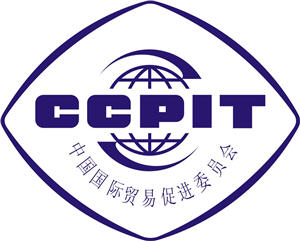
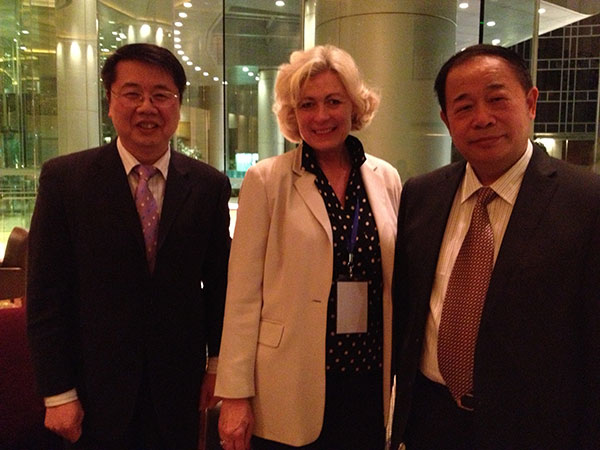
Peter Lin (left) of CCPIT and Shandong Chamber, Susanne Stirling, and Ma Xiao of the CCPIT.
Dinner at China Club
The delegation concluded the day with dinner at the China Club. This Qing Dynasty restaurant is a former palace and a historical landmark that consists of four main interconnected pavilions and courtyards. It has been extensively renovated and restored to its royal glory. Governor Edmund G. Brown Jr. spoke to the delegation, saying he is looking forward to reporting on a number of successes during the week.
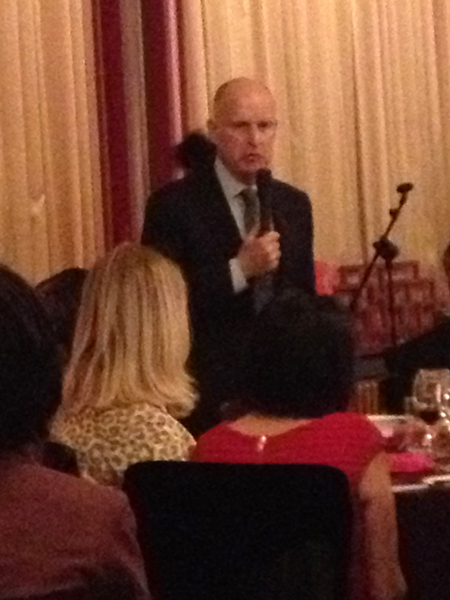
Governor Brown at the delegation dinner, which was hosted by United Airlines.
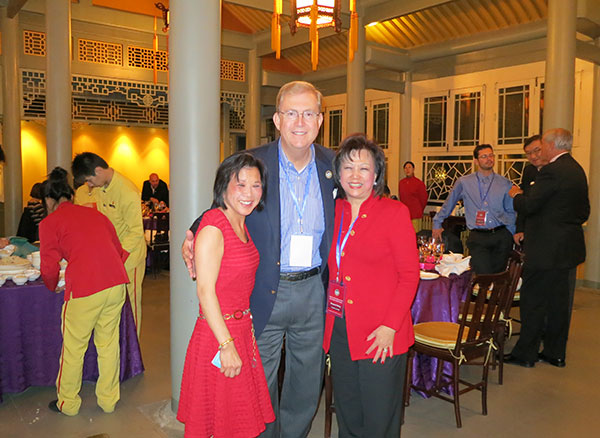
Melinda Yee of United Airlines (host of dinner), Bill Allen, president and CEO of the Los Angeles
Economic Development Corporation, Margaret Wong, president and CEO of McWong International, Inc.
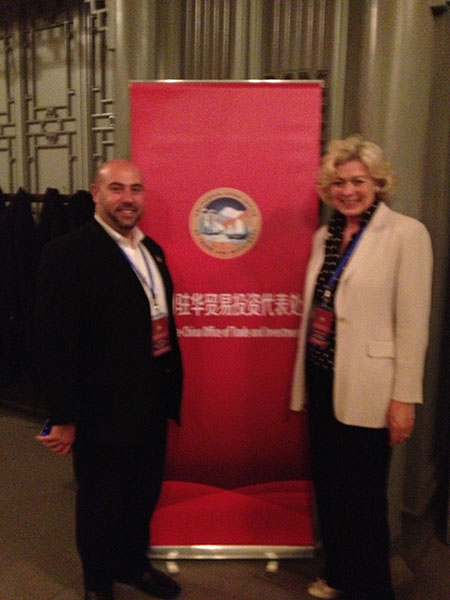
Paul Oliva, deputy director of international affairs and business development
for GO-Biz, and Susanne Stirling before the delegation dinner with the Governor.


